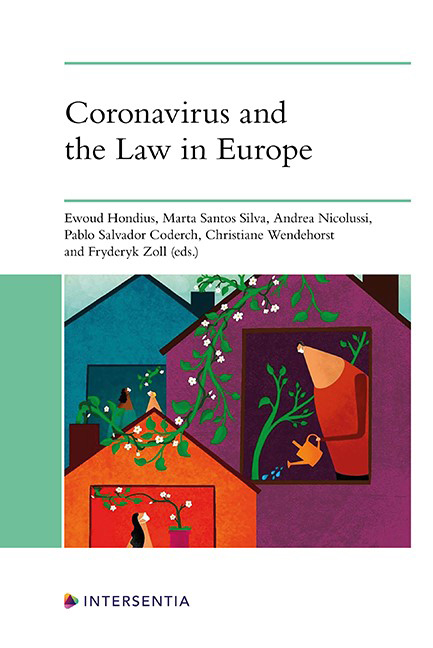Book contents
- Frontmatter
- Preface
- Contents
- List of Keywords
- List of Contributors
- PART I COVID-19 AND FUNDAMENTAL RIGHTS
- PART II STATES AGAINST THE PANDEMIC
- PART III COMPENSATION FOR COVID-19 RELATED DAMAGE
- PART IV CONTRACT LAW
- PART V CONSUMER LAW
- PART VI LABOUR AND SOCIAL LAW
- PART VII CORONAVIRUS CHANGING EUROPE
- Epilogue
- Annex: ELI Principles for the COVID-19 Crisis
- About the Editors
Relevance of the Contractual Solidarity at the Times of Pandemics
Published online by Cambridge University Press: 10 December 2021
- Frontmatter
- Preface
- Contents
- List of Keywords
- List of Contributors
- PART I COVID-19 AND FUNDAMENTAL RIGHTS
- PART II STATES AGAINST THE PANDEMIC
- PART III COMPENSATION FOR COVID-19 RELATED DAMAGE
- PART IV CONTRACT LAW
- PART V CONSUMER LAW
- PART VI LABOUR AND SOCIAL LAW
- PART VII CORONAVIRUS CHANGING EUROPE
- Epilogue
- Annex: ELI Principles for the COVID-19 Crisis
- About the Editors
Summary
This contribution aims to outline, in a general perspective, the different possible strategies to respond from the normative point of view to the consequences, direct or indirect, on the contractual relations of the COVID-19 pandemic: a solution entrusted to the jurisprudential law seems appreciable for its elasticity, but the requirements of certainty and predictability appear pre-eminent to be assured only by the legislative intervention.
THE FIRST IMPACT OF THE COVID-19 PANDEMIC ON ITALIAN LAW OF CONTRACTS
In the few months that have lapsed since the dramatic health emergency linked to the spread of the COVID-19 pandemic, much research has reflected on its impact on civil law, and in particular on the law of contracts and other obligations.
The coordinates of the debate have, therefore, already been set. They begin from the awareness of the absolute exceptionality of the situation that the whole world is now experiencing. Then, questions rise on the identification of the instruments through which we can (try to) face it as to its impact on the execution of contractual relationships and, more generally, on the implementation of obligation.
In this perspective, the strong and evocative appeal to the idea of community as a common commitment and munus must be recalled, which has immediately found development in the passionate argument of an author, intended to prefigure “a joint evolution of the system in terms of effectiveness ” to be achieved through the contribution of all legal experience: legislator, jurisprudence, doctrine. And the principle, or even the value, of solidarity is also evoked in other contributions, assuming a reinterpretation in the perspective of solidarity of the same concept of the unexpected impossibility of performance. This widens the possibility of application of the general clause of good faith, in the sense of opening up to renegotiation mechanisms of contractual agreements, for example, in the field of rental contracts for real estate for commercial use. Good faith is even considered by some scholars as a criterion for verifying the possible ineffectiveness of the out-of-court exercise of the right during the period of suspension of court activity. In fact, this circumstance deprives the addressee of the out-of-court initiative of others to challenge it in court.
- Type
- Chapter
- Information
- Coronavirus and the Law in Europe , pp. 1111 - 1118Publisher: IntersentiaPrint publication year: 2021



